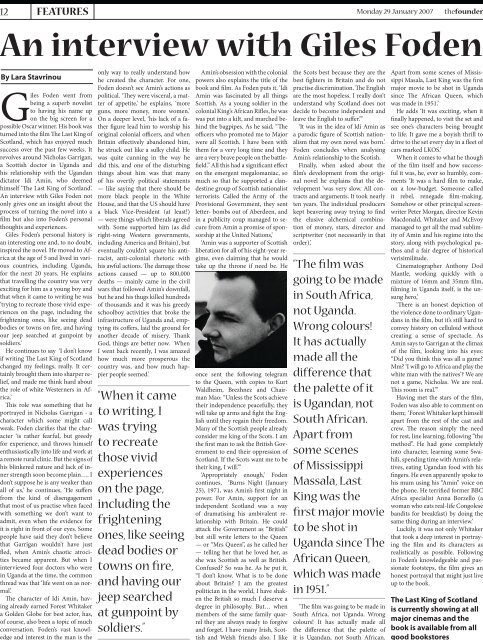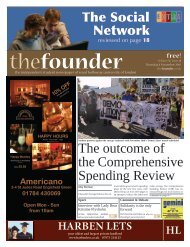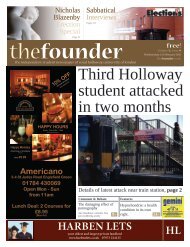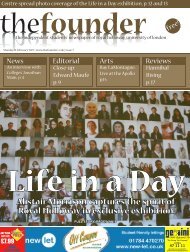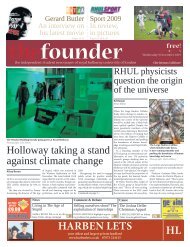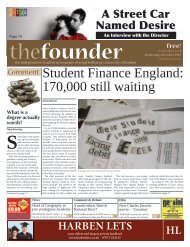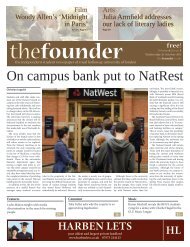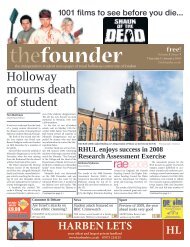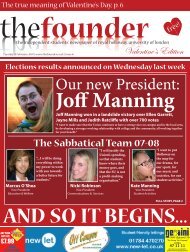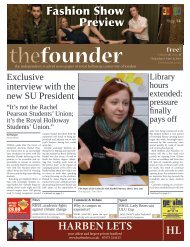GM FORECASTS RADICAL CHANGE - The Founder
GM FORECASTS RADICAL CHANGE - The Founder
GM FORECASTS RADICAL CHANGE - The Founder
You also want an ePaper? Increase the reach of your titles
YUMPU automatically turns print PDFs into web optimized ePapers that Google loves.
2 FEATURES Monday 29 January 2007 thefounder<br />
An interview with Giles Foden<br />
By Lara Stavrinou<br />
Giles Foden went from<br />
being a superb novelist<br />
to having his name up<br />
on the big screen for a<br />
possible Oscar winner. His book was<br />
turned into the film <strong>The</strong> Last King of<br />
Scotland, which has enjoyed much<br />
success over the past few weeks. It<br />
revolves around Nicholas Garrigan,<br />
a Scottish doctor in Uganda and<br />
his relationship with the Ugandan<br />
dictator Idi Amin, who deemed<br />
himself ‘<strong>The</strong> Last King of Scotland’.<br />
An interview with Giles Foden not<br />
only gives one an insight about the<br />
process of turning the novel into a<br />
film but also into Foden’s personal<br />
thoughts and experiences.<br />
Giles Foden’s personal history is<br />
an interesting one and, to no doubt,<br />
inspired the novel. He moved to Africa<br />
at the age of 5 and lived in various<br />
countries, including Uganda,<br />
for the next 20 years. He explains<br />
that travelling the country was very<br />
exciting for him as a young boy and<br />
that when it came to writing he was<br />
‘trying to recreate those vivid experiences<br />
on the page, including the<br />
frightening ones, like seeing dead<br />
bodies or towns on fire, and having<br />
our jeep searched at gunpoint by<br />
soldiers.’<br />
He continues to say ‘I don’t know<br />
if writing <strong>The</strong> Last King of Scotland<br />
changed my feelings, really. It certainly<br />
brought them into sharper relief,<br />
and made me think hard about<br />
the role of white Westerners in Africa.’<br />
This role was something that he<br />
portrayed in Nicholas Garrigan - a<br />
character which some might call<br />
weak. Foden clarifies that the character<br />
‘is rather fearful, but greedy<br />
for experience, and throws himself<br />
enthusiastically into life and work at<br />
a remote rural clinic. But the signs of<br />
his blinkered nature and lack of inner<br />
strength soon become plain…. I<br />
don’t suppose he is any weaker than<br />
all of us,’ he continues, ‘He suffers<br />
from the kind of disengagement<br />
that most of us practise when faced<br />
with something we don’t want to<br />
admit, even when the evidence for<br />
it is right in front of our eyes. Some<br />
people have said they don’t believe<br />
that Garrigan wouldn’t have just<br />
fled, when Amin’s chaotic atrocities<br />
became apparent. But when I<br />
interviewed four doctors who were<br />
in Uganda at the time, the common<br />
thread was that ‘life went on as normal’.<br />
<strong>The</strong> character of Idi Amin, having<br />
already earned Forest Whitaker<br />
a Golden Globe for best actor, has,<br />
of course, also been a topic of much<br />
conversation. Foden’s vast knowledge<br />
and interest in the man is the<br />
only way to really understand how<br />
he created the character. For one,<br />
Foden doesn’t see Amin’s actions as<br />
political. ‘<strong>The</strong>y were visceral, a matter<br />
of appetite,’ he explains, ‘more<br />
guns, more money, more women.’<br />
On a deeper level, ‘his lack of a father<br />
figure lead him to worship his<br />
original colonial officers, and when<br />
Britain effectively abandoned him,<br />
he struck out like a sulky child. He<br />
was quite cunning in the way he<br />
did this, and one of the disturbing<br />
things about him was that many<br />
of his overtly political statements<br />
— like saying that there should be<br />
more black people in the White<br />
House, and that the US should have<br />
a black Vice-President (at least!)<br />
— were things which liberals agreed<br />
with. Some supported him (as did<br />
right-wing Western governments,<br />
including America and Britain), but<br />
eventually couldn’t square his antiracist,<br />
anti-colonial rhetoric with<br />
his awful actions. <strong>The</strong> damage those<br />
actions caused — up to 800,000<br />
deaths — mainly came in the civil<br />
wars that followed Amin’s downfall,<br />
but he and his thugs killed hundreds<br />
of thousands and it was his greedy<br />
schoolboy activities that broke the<br />
infrastructure of Uganda and, emptying<br />
its coffers, laid the ground for<br />
another decade of misery. Thank<br />
God, things are better now. When<br />
I went back recently, I was amazed<br />
how much more prosperous the<br />
country was, and how much happier<br />
people seemed.’<br />
“When it came<br />
to writing, I<br />
was trying<br />
to recreate<br />
those vivid<br />
experiences<br />
on the page,<br />
including the<br />
frightening<br />
ones, like seeing<br />
dead bodies or<br />
towns on fire,<br />
and having our<br />
jeep searched<br />
at gunpoint by<br />
soldiers.”<br />
Amin’s obsession with the colonial<br />
powers also explains the title of the<br />
book and film. As Foden puts it, ‘Idi<br />
Amin was fascinated by all things<br />
Scottish. As a young soldier in the<br />
colonial King’s African Rifles, he was<br />
was put into a kilt, and marched behind<br />
the bagpipes. As he said, “<strong>The</strong><br />
officers who promoted me to Major<br />
were all Scottish. I have been with<br />
them for a very long time and they<br />
are a very brave people on the battlefield.”<br />
All this had a significant effect<br />
on the emergent megalomaniac, so<br />
much so that he supported a clandestine<br />
group of Scottish nationalist<br />
terrorists. Called the Army of the<br />
Provisional Government, they sent<br />
letter- bombs out of Aberdeen, and<br />
in a publicity coup managed to secure<br />
from Amin a promise of sponsorship<br />
at the United Nations,’<br />
‘Amin was a supporter of Scottish<br />
liberation for all of his eight-year regime,<br />
even claiming that he would<br />
take up the throne if need be. He<br />
once sent the following telegram<br />
to the Queen, with copies to Kurt<br />
Waldheim, Brezhnez and Chairman<br />
Mao: “Unless the Scots achieve<br />
their independence peacefully, they<br />
will take up arms and fight the English<br />
until they regain their freedom.<br />
Many of the Scottish people already<br />
consider me king of the Scots. I am<br />
the first man to ask the British Government<br />
to end their oppression of<br />
Scotland. If the Scots want me to be<br />
their king, I will.”’<br />
‘Appropriately enough,’ Foden<br />
continues, ‘Burns Night (January<br />
25), 1971, was Amin’s first night in<br />
power. For Amin, support for an<br />
independent Scotland was a way<br />
of dramatising his ambivalent relationship<br />
with Britain. He could<br />
attack the Government as “British”<br />
but still write letters to the Queen<br />
— or “Mrs Queen”, as he called her<br />
— telling her that he loved her, as<br />
she was Scottish as well as British.<br />
Confused? So was he. As he put it,<br />
“I don’t know. What is to be done<br />
about Britain? I am the greatest<br />
politician in the world, I have shaken<br />
the British so much I deserve a<br />
degree in philosophy. But… when<br />
members of the same family quarrel<br />
they are always ready to forgive<br />
and forget. I have many Irish, Scottish<br />
and Welsh friends also. I like<br />
the Scots best because they are the<br />
best fighters in Britain and do not<br />
practise discrimination. <strong>The</strong> English<br />
are the most hopeless. I really don’t<br />
understand why Scotland does not<br />
decide to become independent and<br />
leave the English to suffer.”’<br />
‘It was in the idea of Idi Amin as<br />
a parodic figure of Scottish nationalism<br />
that my own novel was born.’<br />
Foden concludes when analysing<br />
Amin’s relationship to the Scotish.<br />
Finally, when asked about the<br />
film’s development from the original<br />
novel he explains that the development<br />
‘was very slow. All contracts<br />
and arguments. It took nearly<br />
ten years. <strong>The</strong> individual producers<br />
kept beavering away trying to find<br />
the elusive alchemical combination<br />
of money, stars, director and<br />
scriptwriter (not necessarily in that<br />
order),’<br />
“<strong>The</strong> film was<br />
going to be made<br />
in South Africa,<br />
not Uganda.<br />
Wrong colours!<br />
It has actually<br />
made all the<br />
difference that<br />
the palette of it<br />
is Ugandan, not<br />
South African.<br />
Apart from<br />
some scenes<br />
of Mississippi<br />
Massala, Last<br />
King was the<br />
first major movie<br />
to be shot in<br />
Uganda since <strong>The</strong><br />
African Queen,<br />
which was made<br />
in 1951.”<br />
‘<strong>The</strong> film was going to be made in<br />
South Africa, not Uganda. Wrong<br />
colours! It has actually made all<br />
the difference that the palette of<br />
it is Ugandan, not South African.<br />
Apart from some scenes of Mississippi<br />
Masala, Last King was the first<br />
major movie to be shot in Uganda<br />
since <strong>The</strong> African Queen, which<br />
was made in 1951.’<br />
He adds ‘It was exciting, when it<br />
finally happened, to visit the set and<br />
see one’s characters being brought<br />
to life. It gave me a boyish thrill to<br />
drive to the set every day in a fleet of<br />
cars marked LKOS.’<br />
When it comes to what he though<br />
of the film itself and how successful<br />
it was, he, ever so humbly, comments<br />
‘It was a hard film to make,<br />
on a low-budget. Someone called<br />
it rebel, renegade film-making.<br />
Somehow or other principal screenwriter<br />
Peter Morgan, director Kevin<br />
Macdonald, Whitaker and McEvoy<br />
managed to get all the mad sublimity<br />
of Amin and his regime into the<br />
story, along with psychological pathos<br />
and a fair degree of historical<br />
verisimilitude.<br />
Cinematographer Anthony Dod<br />
Mantle, working quickly with a<br />
mixture of 16mm and 35mm film,<br />
filming in Uganda itself, is the unsung<br />
hero,’<br />
‘<strong>The</strong>re is an honest depiction of<br />
the violence done to ordinary Ugandans<br />
in the film, but it’s still hard to<br />
convey history on celluloid without<br />
creating a sense of spectacle. As<br />
Amin says to Garrigan at the climax<br />
of the film, looking into his eyes:<br />
“Did you think this was all a game?<br />
Mm? ‘I will go to Africa and play the<br />
white man with the natives’? We are<br />
not a game, Nicholas. We are real.<br />
This room is real.”’<br />
Having met the stars of the film,<br />
Foden was also able to comment on<br />
them; ‘Forest Whitaker kept himself<br />
apart from the rest of the cast and<br />
crew. <strong>The</strong> reason simply the need<br />
for rest, line learning, following “the<br />
method”. He had gone completely<br />
into character, learning some Swahili,<br />
spending time with Amin’s relatives,<br />
eating Ugandan food with his<br />
fingers. He even apparently spoke to<br />
his mum using his “Amin” voice on<br />
the phone. He terrified former BBC<br />
Africa specialist Anna Borzello (a<br />
woman who eats real-life Congolese<br />
bandits for breakfast) by doing the<br />
same thing during an interview.’<br />
Luckily, it was not only Whitaker<br />
that took a deep interest in portraying<br />
the film and its characters as<br />
realistically as possible. Following<br />
in Foden’s knowledgeable and passionate<br />
footsteps, the film gives an<br />
honest portrayal that might just live<br />
up to the book.<br />
<strong>The</strong> Last King of Scotland<br />
is currently showing at all<br />
major cinemas and the<br />
book is available from all<br />
good bookstores


